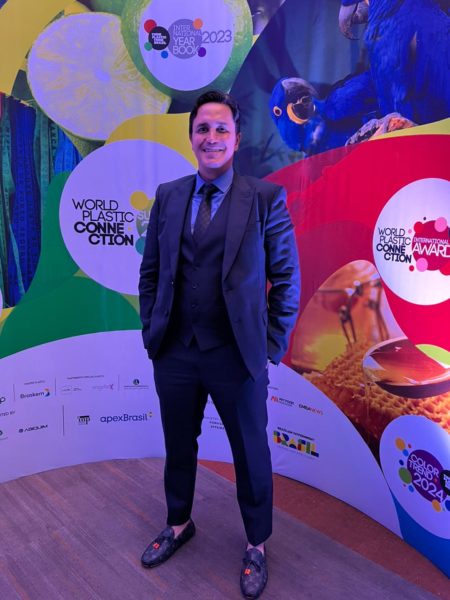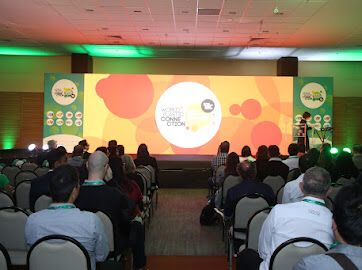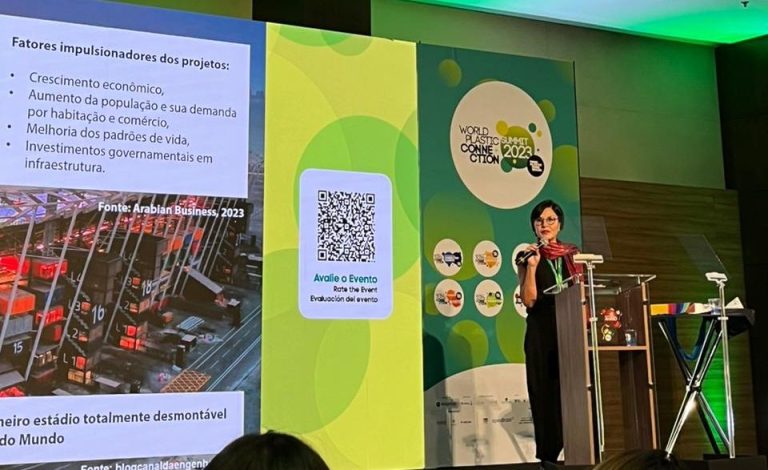São Paulo – The 3rd edition of the World Plastic Connection Summit opened this Monday (21) in the city of Barueri, in the São Paulo metropolitan area, spreading knowledge among industry players with the latest innovations in the industry and trends of the Arab market. Considered Brazil’s leading event in the plastics sector with an international focus, it is held by the Think Plastic Brazil program, carried out by the National Institute of Plastics (INP) and the Brazilian Trade and Investment Promotion Agency (ApexBrasil) to internationalize the segment.

Some of the event topics include sustainability demands, successful cases, circular economy, competitiveness, challenges, and product design. “The main goal of the event is to highlight Brazil as one of the main global players in the internationalization of the plastics industry,” said Carlos Moreira, project manager at Think Plastic Brazil. According to the executive, over 100 countries are participating in the summit. “Through the lectures, we will show the plastic sector is concerned with sustainability and invests heavily in social action,” said Moreira.
Moreira spoke to ANBA on the summit’s opening day when the Arab market was the subject of a lecture by the Marketing & Content director of the Arab Brazilian Chamber of Commerce (ABCC), Silvana Gomes. According to Moreira, the Arab market is very receptive to Brazilian plastic, and there is still room for more deals. “In November 2018, I made the first mission to the Arab market on plastics. We started with Qatar and had some appointments, then we headed to the United Arab Emirates, Kuwait, and Oman,” he reported.
He explained at the time, two companies were exporting to the Middle East, and among the products sold were water tanks. With the pandemic, Arab buyers, who imported plastics mainly from China and Europe, adapted and started doing business online with Brazilians as well. The business grew between the two markets, and 22 Brazilian companies currently export to Arab countries like Saudi Arabia, Egypt, and Yemen.
“Arabs want to go global”
Speaking about competitiveness in housewares and civil construction in Arab countries, Gomes showed that to please that market; the Brazilian plastic sector needs to make sophisticated and minimalist products. Furthermore, the director explained Arab buyers, mostly young, are more connected than Brazilians, educated, and speak English very well, and the region is undergoing an intense automation process. She also said those consumers want to be globalized and have different types of purchasing power.
In addition to being concerned with serving the local population, Brazilian companies must also pay attention to serving foreigners who live in Arab countries, like Qatar and the UAE, recommended Gomes. “Over 70% of the population of the two nations is made up of foreigners, so if a brand expects to sell only to locals, it will not be successful,” stated Gomes.

Gomes suggested adapting household items to disruptive shapes and colors in the lecture. “This area of houseware design needs to be reinvented. Brazilian consumers themselves demand better design; we no longer buy primary products. Companies must look at international aesthetics and global consumer demands, including sustainability, luxury, innovation, and technology, to get inspiration when creating products.”
Regarding exports successful among Arabs, in addition to household items, are plastic panels used in decoration and construction. “They are not directly sold to end consumers. For this reason, this sector could be greatly explored, as the volume Brazil exports is small compared to the total imported by the Arab nations,” explained Gomes.
She also suggested that Brazilian exporters look to the Arab countries beyond the Gulf. “The markets in North Africa and the Levant still do not have a massive presence of the Brazilian plastic sector, but they present many opportunities. Syria, Iraq, and Lebanon have reconstruction projects, so civil construction could start looking at these countries as opportunities for growth.”
Summit attractions
In the first days of the World Plastic Connection Summit, the launches of the International Color Trend 2024 will take place, with color trends in the plastic market and the Yearbook 2023, which presents information on the 190 Brazilian companies members of Think Plastic Brazil. “With the presentation of the International Color Trend 2024, we want to show we are prepared to offer our products to the world,” said Moreira.

On August 23 and 24, the buyer project will take place with a negotiation table and networking area. Technical visits will also be made to the plants of Think Plastic Brazil program member companies.
“We will also have the delivery of the International Awards, the recognition to companies investing in the internationalization process,” said Moreira.
According to Moreira, the subsequent editions of the World Plastic Connection Summit could be even more significant. “The main goal is to place the summit on the calendar of the leading players in the market. We want to train companies and change their mindset,” added Moreira.
How to participate
All event lectures are live broadcast in Portuguese, Spanish, and English. The World Plastic Connection Summit occurs in a hybrid format (in-person and online). To follow the event in person, participants must register on the website and go to the Blue Tree Premium Alphaville hotel at Alameda Madeira, 398 – Alphaville, Barueri, São Paulo.
The event has the support of Valgroup, Braskem, Colorfix & Engeflex, ABCC, the Brazilian Plastic Industry Association (Abiplast), and the Brazilian Chemical Industry Association (Abiquim), among others.
Special report by Rebecca Vettore for ANBA.
Translated by Elúsio Brasileiro




